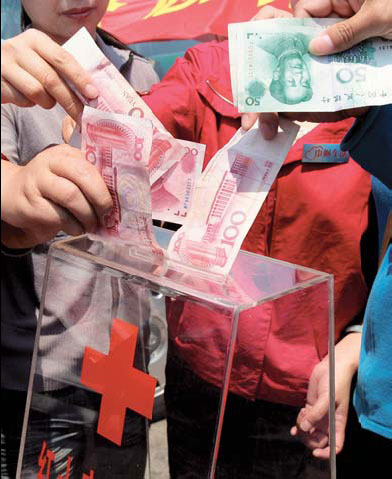Committee reports flaw in China's Red Cross style of management
|
People enthusiastically put some of their savings into a donation box owned by the Red Cross Society of China after the Sichuan earthquake in 2008. A Xinhua report quoted Twitter-like Sina micro-bloggers as saying more than 500 donation boxes set up by the Chengdu branch of the RCSC following the devastating 2008 Wenchuan earthquake in Sichuan were left unattended. An Xin / For China Daily |
A special supervisory committee for the Red Cross Society of China has confirmed the mismanagement of donation boxes in Chengdu, in Southwest China's Sichuan province.
On Jan 4, a news conference held by the society declared another allegation as "untrue".
According to the committee's preliminary investigation, some donation boxes in Chengdu have been abandoned or stolen over the years and some of the cash inside has grown moldy, said Wang Yong, a spokesman for the committee.
Some people reported online that more than 500 donation boxes set up by the Chengdu branch of the RCSC following the devastating 2008 Wenchuan earthquake in Sichuan have been left unattended to.
Some of these boxes have been damaged or stolen and mold has grown on some of the cash inside, according to users of the Twitter-like Sina Weibo.
The posts aroused a public outcry and fueled online discussions about the RCSC, which is currently drafting a reform plan due to "credibility crisis" scandals since 2011.
"The online reports were largely confirmed to be true following a site survey carried out by a three-member team of the supervisory committee in Chengdu," said Wang.
Wang said in June 2008, the Chengdu branch of the RCSC signed a 20-year agreement with an advertising company to set up 700 boxes in public spaces to collect donations.
"The two sides had disagreements on the donation boxes' daily maintenance and passed the buck between them," he said.
At the news conference the committee also announced the investigation result concerning another online report that said the RCSC purchased several villas in Beijing and operated them as leisure sites.
"The report is not true because these villas do not belong to the RCSC. There is no evidence that shows any relationship between the RCSC and these villas," Wang added.
Chinese charities have faced a "trust crisis" following several scandals since 2011.
In a notable case, a woman calling herself Guo Meimei claimed in micro blog posts in June 2011 that she worked for an organization under the RCSC and detailed her lavish lifestyle.
Although the RCSC later denied the existence of such an organization, the case led to public calls for scrutinizing charity funds.
In December, the RCSC set up a special 16-member committee to supervise donation collection and management.
Professional experts and public celebrities from the media, law, accounting and other fields joined the committee as volunteers, said Huang Weimin, the committee's secretary-general.
Committee members do not receive payment from the RCSC and at least three of them will join each investigation into major issues of public concern.
The public is calling for more transparency and openness in the RCSC. Concerns and disputes have prompted the RCSC to rethink and start to reform, said Huang.
"We will play a supervision role under the principles of independence, justice, openness and professionalism at this critical moment of China's philanthropy," said Huang.



















